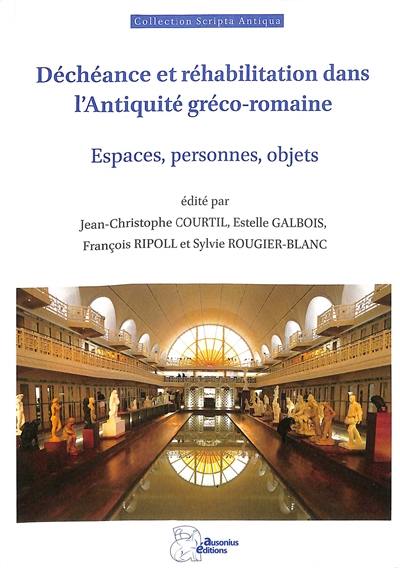
Fiche technique
Format : Broché
Nb de pages : 452 pages
Poids : 946 g
Dimensions : 17cm X 24cm
ISBN : 978-2-35613-599-5
EAN : 9782356135995
Déchéance et réhabilitation dans l'Antiquité gréco-romaine
espaces, personnes, objets
Quatrième de couverture
Les pratiques de classement et de taxinomie dans l'Antiquité gréco-romaine ont été bien étudiées. En revanche, les processus de déchéance, de déclassement et de réhabilitation ou de reclassement associés ont moins retenu l'attention des Antiquisants, à l'exception peut-être de la damnatio memoriae. L'objectif de cet ouvrage, issu en grande partie d'un colloque international organisé par l'équipe PLH-CRATA en avril 2019 à l'université Toulouse-Jean Jaurès, est d'aborder, dans une approche inversée, ce qui motive les Anciens à rejeter ou mettre à l'écart d'un regroupement préalable - en d'autres mots à déchoir - un objet, une personne, un espace, une pratique, d'une position préalablement bien établie et reconnue de tous. Les modalités de déchéance, les circonstances et le cadre d'une réhabilitation (quand elle existe) ont particulièrement retenu l'attention des chercheurs français et étrangers. Appartenant à des disciplines différentes (histoire, histoire de l'art, anthropologie, archéologie), ils ont étudié des processus de déchéance associée ou non à une réhabilitation frappant des personnes, des objets, des espaces, voire des cités dans le monde grec comme dans le monde romain, et sur la longue durée. À travers ces analyses, ils interrogent l'existence de processus de réutilisation, de resémantisation, voire de résilience, bref les modalités d'une dynamique sociale au sein des mondes grec et romain.
The practices of classification and taxonomy in Greco-Roman antiquity have been well studied. However, the processes of downgrading, demotion and associated reinstatement or reclassification have received less attention from scholars, with the possible exception of damnatio memoriae, a concept already described by the ancients. The aim of this book, which is largely the result of an international conference organised by PLH-CRATA in April 2019 at the University of Toulouse-Jean Jaurès, is to address, in a reverse approach, what impelled the ancients to discard or set aside from a prior grouping - in other words, to downgrade - an object, a person, a place, a practice, from a previously well-established and universally-recognised position. The modalities of downgrading, the circumstances and the framework of reinstatement (when it exists) have particularly attracted the attention of French and foreign researchers. Belonging to different disciplines (history, art history, anthropology, archaeology), they have studied the processes of downgrading, whether or not associated with reinstatement, affecting people, objects, spaces, and even cities in the Roman world, as in the Greek world, over the long term. Through these analyses, they question the existence of processes of reuse, re-semantisation, and even resilience, in short, the modalities of a social dynamic within the Greco-Roman worlds.





